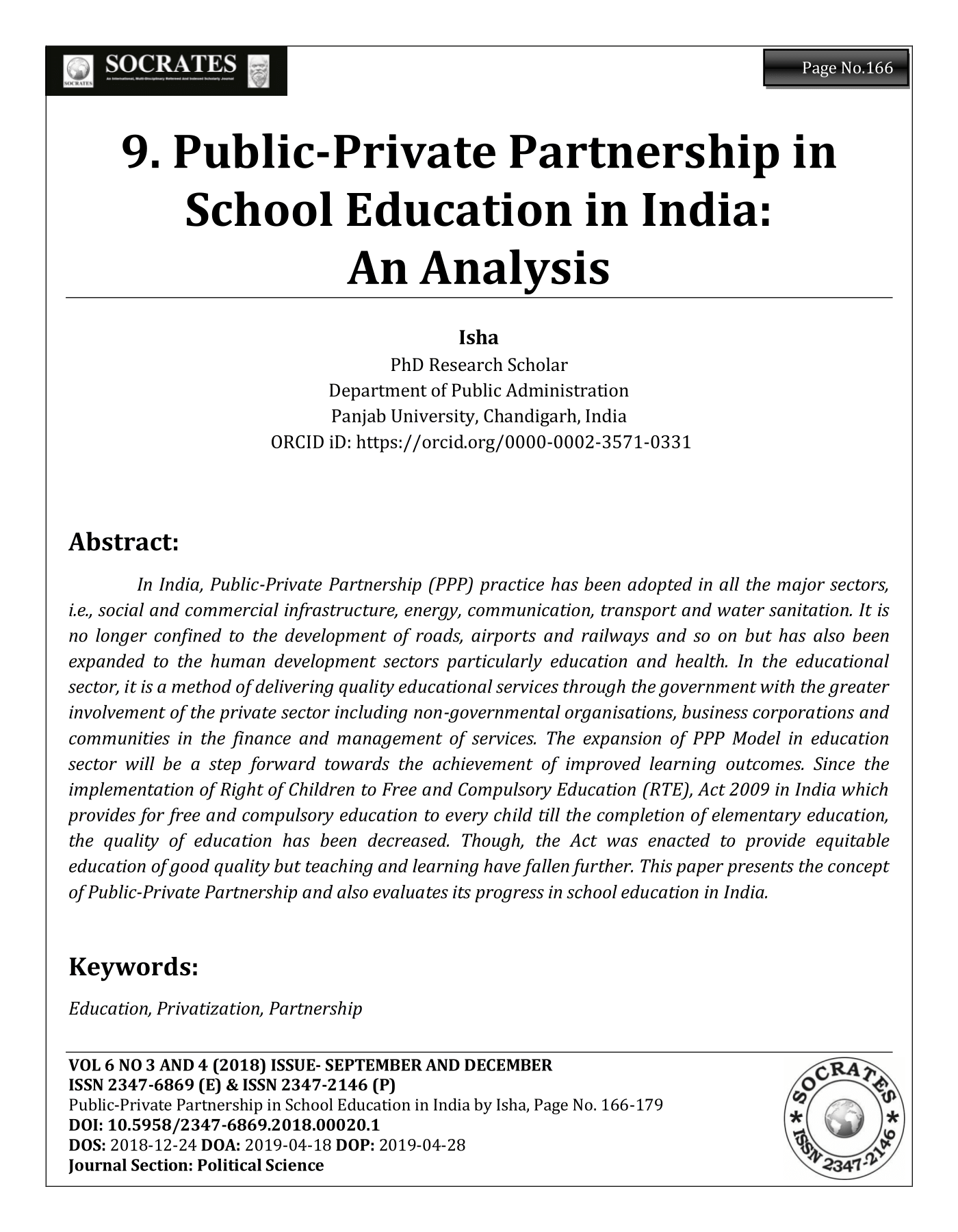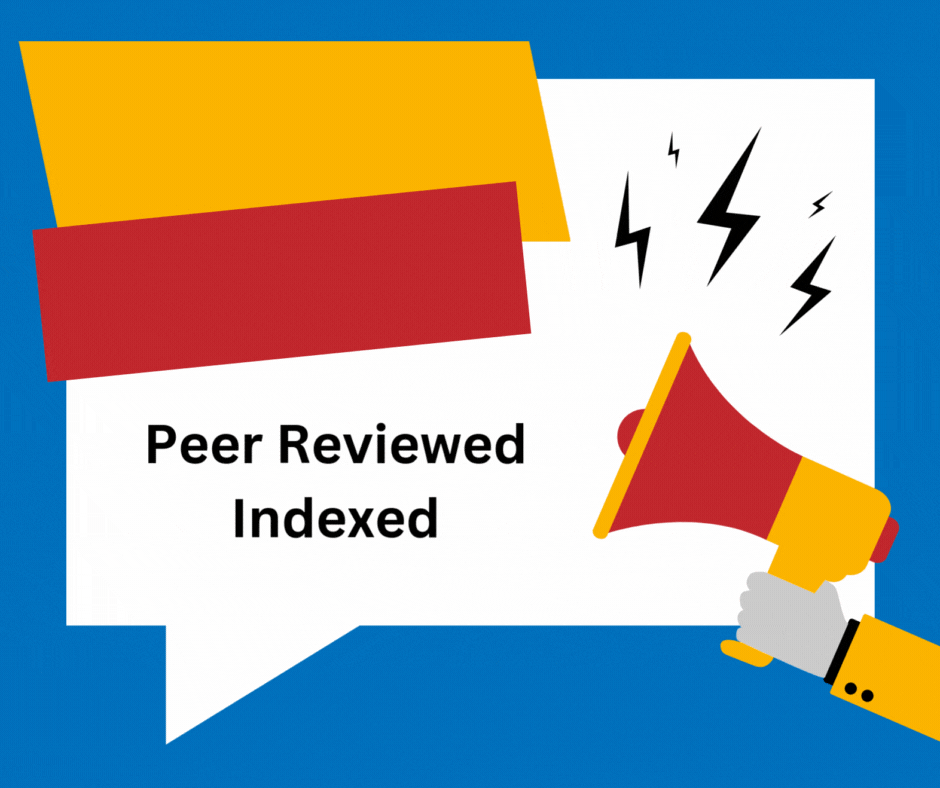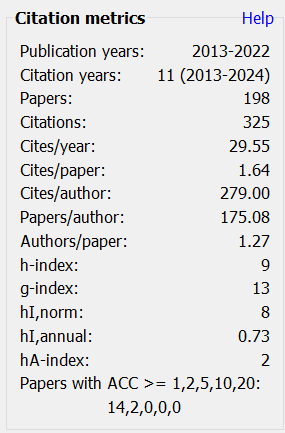Public-Private Partnership in School Education in India
An Analysis
DOI:
https://doi.org/10.5958/2347-6869.2018.00020.1Keywords:
Education, Privatization, PartnershipAbstract
In India, Public-Private Partnership (PPP) practice has been adopted in all the major sectors, i.e., social and commercial infrastructure, energy, communication, transport and water sanitation. It is no longer confined to the development of roads, airports and railways and so on but has also been expanded to the human development sectors particularly education and health. In the educational sector, it is a method of delivering quality educational services through the government with the greater involvement of the private sector including non-governmental organisations, business corporations and communities in the finance and management of services. The expansion of PPP Model in education sector will be a step forward towards the achievement of improved learning outcomes. Since the implementation of Right of Children to Free and Compulsory Education (RTE), Act 2009 in India which provides for free and compulsory education to every child till the completion of elementary education, the quality of education has been decreased. Though, the Act was enacted to provide equitable education of good quality but teaching and learning have fallen further. This paper presents the concept of Public-Private Partnership and also evaluates its progress in school education in India.
DOI: 10.5958/2347-6869.2018.00020.1
Downloads
Metrics
References
Chaudhry, S. & Uboweja, A. (2014), Public-Private Partnerships in School Education Learning and Insights for India, Working Paper, March 2014, Retrieved from, http://www.centralsquarefoundation.org/wp-content/uploads/ 2015/08 /pp p_in_school_ education.pdf
Gopalan, P. (2013), PPP Paradox Promise and perils of Public- Private Partnership in education, India, SAGE.
Department of Economic Affairs, Ministry of Finance (2015), Report of the Committee on Revisiting and Revitalizing Public Private Partnership Model on Infrastructure, November 2015, Retrieved from, https://www.pppinindia.gov.in/infrastructureindia/ documents/10184/0/kelkar+Pdf/0d6ffb64-4501-42ba-a083-ca3ce99cf999
Department of School Education and Literacy, Ministry of Human Resource Development, Government of India (2011), Report of the Working Group on Private Sector participation including PPP in School Education for the 12th Five Year Plan, October 2011, Retrieved from, http://planningcommission.gov.in/aboutus/committee/wrkgrp 12/hrd/wg_pppschool1708.pdf
Department of School Education and Literacy, Ministry of Human Resource Development, Government of India, Overview, Retrieved from, http://mhrd.gov.in/model_school
Department of School Education and Literacy, Ministry of Human Resource Development, Government of India, Model School Under State/UT Government, Retrieved from http://mhrd.gov.in/model_school_state_ut
Department of School Education and Literacy, Ministry of Human Resource Development, Government of India, Model School Under Public-Private Partnership (PPP) Mode, Retrieved from http://mhrd.gov.in/model_school_ppp
Department of School Education and Literacy, Ministry of Human Resource Development, Government of India, Model School State-wise Details, Retrieved from https://mhrd.gov.in/model_school_state_details
Ministry of Human Resource Development, Government of India, Scheme for setting up of 6000 Model Schools at Block Level as benchmark of excellence, Retrieved from http://mhrd.gov.in/sites/upload_files/mhrd/files/upload_document/Model%20School%20Scheme-State%20Sector.pdf
Ministry of Human Resource Development, Government of India, Request for Qualification for Rashtriya Adarsh Vidyalaya through Public Private Partnership, Retrieved from http://mhrd.gov.in/sites/upload_files/mhrd/files/MHRD_RFQ_clean_Final%20-.pdf
National Council of Educational Research and Training (1970), Education and National Development, Report of the Education Commission, 1964-66 (Vol.I), Retrieved from http://udise.in/Downloads/KothariCommissionVol.1pp.1-287.pdf
NITI Aayog, Government of India, Rebooting Public Private Partnership in India, Retrieved from http://niti.gov.in/writereaddata/files/document_publication/REBOOTING%20PPP%20IN%20INDIA_blog.pdf
Parvathy V K (2013), PPP in the Education Sector, Retrieved from https://qrius.com/ppp-in-the-education-sector/
The World Bank (2009), The Role and Impact of Public-Private Partnerships in Education, Retrieved from, https://openknowledge.worldbank.org/bitstream/handle/10986/2612/47 9490PUB0Role101OFFICIAL0USE0ONLY1.pdf?sequence=1
The Ministry of Human Resource Development, Government of India (2014), Revised Norms of Recurring Grants, Retrieved from, http://mhrd.gov.in/sites/upload_files/mhrd/files/ upload_document/Revised-%20norms-recurring-grants.pdf

Downloads
Published
How to Cite
Issue
Section
Categories
License
Copyright (c) 2019 Isha

This work is licensed under a Creative Commons Attribution-NonCommercial 4.0 International License.
Revised Copyright/CC license that applies to all the articles published after 05-02-2017
Attribution-NonCommercial 4.0 International (CC BY-NC 4.0)

Copyright/CC license that applies to all the articles published before 05-02-2017
Attribution-Non Commercial-No Derivatives 4.0 International (CC BY-NC-ND 4.0)

Author(s) will retain all the right except commercial and re-publishing rights. In the case of re-publishing, they will have to obtain written permission from the journal. Additional licensing agreements (Creative Commons licenses) grants rights to readers to copy, distribute, display and perform the work as long as you give the original author(s) credit, they can not use the works for commercial purposes and are not allowed to alter, transform, or build upon the work. For any reuse or distribution, readers and users must make clear to others the license terms of this work. Any of these conditions can be waived if you get permission from the copyright holders. Nothing in this license impairs or restricts the authors’ rights. To view a copy of this license, visit http://creativecommons.org/licenses/by-nc-nd/4.0/ or send a letter to Creative Commons, 171 Second Street, Suite 300, San Francisco, California, 94105, USA.
Research Papers published in SOCRATES are licensed under an Attribution-NonCommercial-NoDerivatives 4.0 International (CC BY-NC-ND 4.0)
















